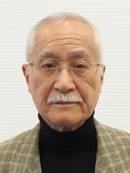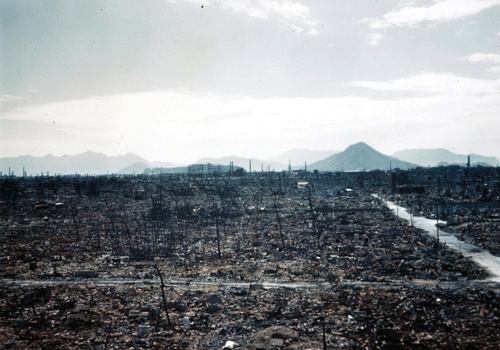Memoir of the A-bombing
“The day that changed the fate of my family”
by Noboru Sueoka
Atomic Bomb Witness for this Foundation

Our family before the bombing
In the year the atomic bomb was dropped, 1945, my family moved from Tokyo to Hiroshima in May or June because my father got a work transfer.
It was a sudden transfer.
My father worked at a major chemical factory.
There were four in my family: my father Shigeru, my mother Kikuko, me (7 years old) and my younger sister Yukiko who was two.My father’s family home was in Nishi-shin-machi (now known as Dohashi-cho, which is very close to Hiroshima Peace Memorial Museum), and for a long time the family ran a large traditional inn.
Once my father’s transfer was decided, we packed our household belongings, sent them to the employee lodgings in Funairi Town in Hiroshima, and left Tokyo in a rush. However, since military supplies were prioritized when sending cargo at that time, we did not know when our belongings might arrive. We did not even have the necessities we needed to live in the employee lodgings, so the only thing we could do was to temporarily move in to my father’s family home in Nishi-shin-machi.
At that time in 1945, the inn that my father’s family owned had stopped business due to the war. There were five people living there―my grandfather Eikichi, my grandmother Ryou, my father’s younger sisters Hatsuyo (the eldest daughter), the frail Tsuyuko, and Fujiko who worked at the prefectural government office. Our family of four was added, and on July 20 my younger brother Hiroshi was born, making us a family of ten.
Up until August 5, the day before that fateful day, we were living a completely normal life as citizens in Nishi-shin-machi.
Coincidence determined the fate of our family
Because there was a concern about air raids on Hiroshima too, at the end of July my mother took just my newly-born brother and younger sisters and temporarily evacuated to a relative’s house near Miyajima.
My father had to work and I had to go to school so we stayed in Hiroshima.Coincidence changed the fate of our family. August 5 was a Sunday. I had decided to go to visit my mother’s place alone. My grandfather strongly opposed this, so I promised him that I would “definitely come home by the end of the day on the 5th, and go to school on the 6th”. However, when I met up with my mother for the first time in a long time and saw my newly-born baby brother, I broke my firm promise to my grandfather and did not come home on the 5th.
The next morning, the 6th, I went out to the seashore in front of my relative’s house and was idly looking over the sea to Hiroshima, which was 20 kilometers away, when all of a sudden, I witnessed a powerful flash, something that I had never seen before. About ten seconds after that came a dull booming sound.
When I think about the fact that in the instant of that flash, Hiroshima was destroyed and tens of thousands of people lost their lives, even now I get goosebumps.
At the time that the bomb was dropped, my father was working at the factory five kilometers away from the hypocenter. For days and days after the bombing, he walked around the burnt ruins of the city looking for his parents and sisters. Finally, he found the bodies of his parents, Hatsuyo, and Tsuyuko under some rubble. It was more than ten days after the bombing that he found their bodies.

Hiroshima reduced to ashes
(October 1945, Photo by US Army, Contributed by Hiroshima Peace Memorial Museum)
Later in life, my father contracted lung cancer and passed away. Fujiko, who left the house together with my father on the morning of the 6th to go to work at the government office, was never found.
In conclusion, our request
Life during the war was full of uncertainty and there were restrictions, but the Japanese people worked together in family units, leading a happy life looking after and supporting one another.
That was the case for my family too.
That family was taken away from me in an instant.At this very moment there is a war waging between countries somewhere. We do not know when nuclear weapons might be used. Nuclear weapons must definitely be abolished. As hibakusha, this is our strong request. Seventy-four years have passed since the end of the war, and there are fewer generations who have experienced war. I firmly believe that now is the time to pass on the tragedy of nuclear weapons more broadly to the whole world―this is the path that will lead to the abolition of nuclear weapons.
Profile [Noboru Sueoka]
Born 1937.
At the time the atomic bomb was dropped, was living in a family of ten people, including his grandparents, in Nishi-shin-machi, 800m from the hypocenter.
On the day of the bombing, the life or death of the family members was decided by pure coincidence.
Has worked as a Hiroshima Peace Volunteer since 2004, as an A-bomb Legacy Successor since 2016, and as an Atomic Bomb Witness since 2017.
Has worked as a Hiroshima Peace Volunteer since 2004, as an A-bomb Legacy Successor since 2016, and as an Atomic Bomb Witness since 2017.
Hiroshima Peace Culture Foundation
1-2 Nakajima-cho, Naka-ku, Hiroshima 730-0811 JAPAN
TEL +81-82-241-5246
Copyright © Since April 1, 2004, Hiroshima Peace Culture Foundation. All rights reserved.